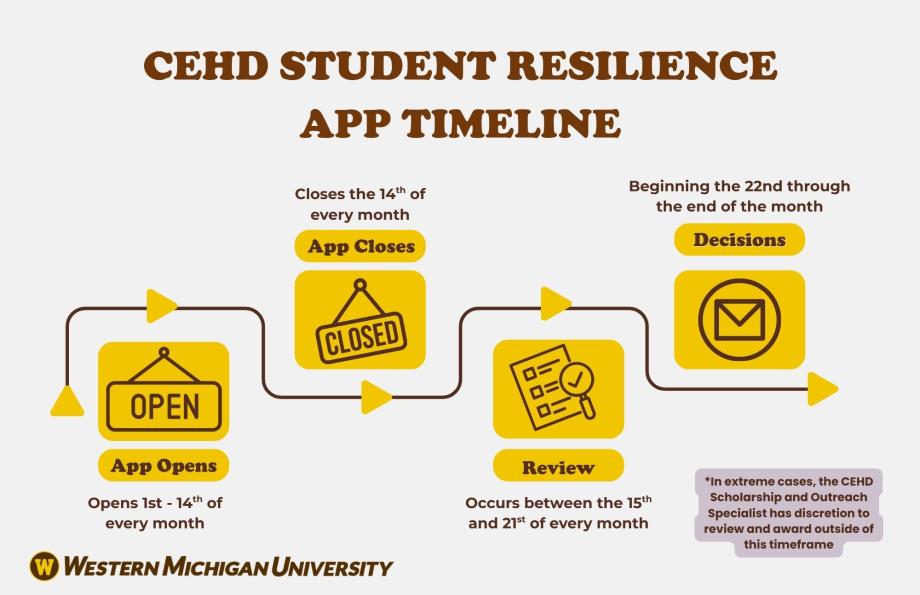Frequently Asked Questions
All currently enrolled CEHD undergraduate and graduate students facing an urgent need which hinders their success in their educational program.
The CEHD Student Resilience Fund is designed to address immediate and urgent needs. It does not cover preemptive or anticipated educational costs, such as future tuition, textbooks, or housing. This fund is intended to help with current barriers that impact your ability to succeed right now.
Eligible urgent needs include:
- Textbooks(s)
- Online access code(s)
- Lab fee(s)
- Testing and/or licensing fee(s)
- Technology (laptop and internet assistance only)
- Student account holds due to an existing balance
- GeoBlue Health Insurance (international students only)
- Transportation assistance such as bus fare, minor car repairs, and gas assistance
- Study abroad related needs (passport and/or visa fees only)
- WMU campus parking permit
- Housing assistance (rent and/or utility assistance)
- Childcare assistance
The CEHD Student Resilience Fund is intended for urgent needs that could disrupt your ability to continue your education. It does not cover:
- New vehicle purchases
- Tuition costs already covered by other aid
- Credit card debt or personal loans
- Entertainment expenses
- Expenses which can be covered by other community/WMU resources
- Expenses which exceed the lifetime award threshold of $3,500 for Freshman and Sophomore students
- Expenses which exceed the lifetime award threshold of $5,000 for Junior, Senior, and Graduate students
The CEHD Student Resilience Fund provides a lifetime award of $3,500 for Freshman and Sophomore students and of $5,000 for Junior, Senior, and Graduate students. Once you have received funding up to this threshold, you are no longer eligible to apply for or receive additional support from this fund. Receiving part of the award does not guarantee that you will receive the full lifetime amount. Funding is awarded based on the amount needed to address each specific urgent need, and each award is evaluated individually.
It's important to note that this fund relies on donations and is not an endowment, meaning it does not have permanent or unlimited funding. Because of this, it is crucial that applicants explore other available resources both on and off WMU's campus to assist them before requesting assistance from this fund.
Each student has access to a lifetime award of $3,500 (for Freshman and Sophomore) and $5,000 (for Junior, Senior, and Graduate level) from the CEHD Student Resilience Fund. You may apply multiple times, but the total funding you receive cannot exceed this lifetime limit. Each award is based on the specific urgent need you are experiencing at the time of application. Receiving part of the award does not guarantee that you will receive the full lifetime amount. Funding decisions are made according to the documented need and available resources. Once you have reached the lifetime threshold, you are no longer eligible to apply or receive additional funding from this fund
Here is the timeline for the CEHD Student Resilience Fund:
- Opens: 1st–14th of each month
- Review: 15th–21st of the month
- Decisions & Notifications: 22nd–end of the month (via WMU email)
- In extreme emergencies, the CEHD Scholarship and Outreach Specialist may review and award applications outside of this timeline.
All CEHD Student Resilience Fund awards are applied directly to a student’s WMU account and go toward any existing balance first. Students with an account balance exceeding the lifetime award of $3,500 (for Freshman and Sophomore level) and $5,000 (for Junior, Senior, and Graduate level) will not be eligible to receive this scholarship. We encourage reducing your balance before applying so it falls at or below the lifetime threshold.
The CEHD Student Resilience Fund has limited resources, and not all applicants will be awarded this financial support. If you do not receive funding, we encourage you to explore other campus resources or financial assistance programs.
Here are some community and WMU resources to explore:
The CEHD Student Resilience Fund is made possible through the generosity of donors in our WMU community. It's important to note this fund relies on donations and is not an endowment, meaning it does not have permanent or unlimited funding.
A Community of Care
The CEHD Student Resilience Fund is made possible through the generosity of CEHD community members—alumni, faculty, staff, and friends—who are committed to helping students overcome financial barriers. Their donations ensure that students can stay on track with their academic goals despite challenges, making a lasting impact on the future of education and human development. We are grateful for their support in empowering students to succeed.
Questions?




